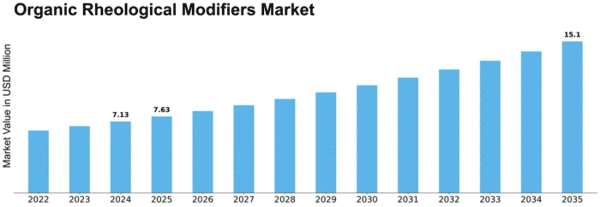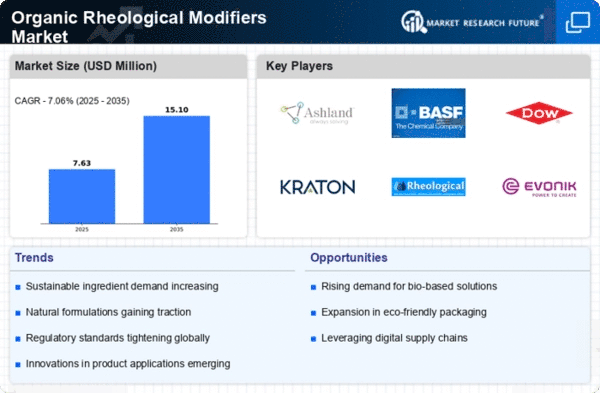Organic Rheological Modifiers Size
Organic Rheological Modifiers Market Growth Projections and Opportunities
Organic Rheological Modifiers market dynamics are shaped by many factors. Demand from paints & coatings, cosmetics, and building drives growth. Organic rheological modifiers, which increase formulation viscosity and stability, are widely used in these fields. These industries' growth and success affect organic rheological modifier demand, making them crucial in many production processes.
The Organic Rheological Modifiers market is driven by regulations and environmental concerns. Organic rheological modifiers, essential components in many formulations, must meet high safety and environmental norms. Manufacturers must follow these requirements to meet regulations and satisfy environmentally concerned consumers. Organic rheological modifiers that meet sustainability goals have influenced market dynamics due to consumer demand for eco-friendly products.
Global economic conditions shape the Organic Rheological Modifiers market. Economic factors including industrial output, construction, and consumer expenditure affect demand for these modifiers. Organic rheological modifier demand rises during economic growth due to increased construction and manufacturing. Conversely, economic downturns may reduce industrial activity, hurting market dynamics.
Technological advances in formulation techniques drive market growth. Technology advances in organic rheological modifier synthesis and manufacture can boost efficiency and cost. Companies that invest in R&D to remain ahead of technology advances might better meet industry needs and acquire a competitive edge.
Organic Rheological Modifiers buyers must consider supply chain characteristics such raw material availability and cost. Biopolymers and other organic molecules are common modifying raw ingredients. Raw material price fluctuations affect production costs and market dynamics. A robust and efficient supply chain is needed to supply organic rheological modifiers to end-users without disruptions and preserve market stability.
Geopolitics and trade policy also influence the Organic Rheological Modifiers market. Tariffs, trade agreements, and geopolitical conflicts affect chemical supply and demand. Market players must adjust to these external influences to manage global trade dynamics.
Key companies, market share, and strategic efforts affect Organic Rheological Modifiers market dynamics. To gain market share, companies innovate, extend their product portfolios, and develop strategic collaborations. Acquisitions and mergers are traditional ways to gain market share and a competitive edge."



















Leave a Comment